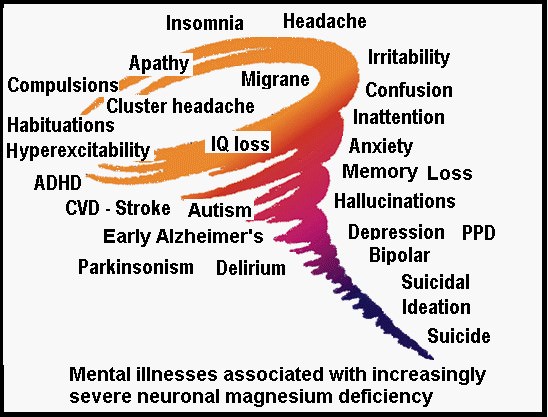
Magnesium is a crucial mineral that offers numerous health benefits as it affects over 300 enzyme systems in the body and is essential for cell function, muscle contraction, nerve signaling, blood pressure regulation, and protein and calcium production.
A deficiency in magnesium is common and can lead to various health issues, underscoring the importance of recognizing signs that could indicate a lack of magnesium in the body.
Why Is Getting Enough Magnesium Challenging?
Obtaining sufficient magnesium used to be easier, but modern dietary trends have made it more challenging. Research shows that current foods contain significantly fewer minerals compared to earlier times, with a notable decline in magnesium content over the years.
Additionally, shifts in dietary habits that involve consuming fewer magnesium-rich foods like beans, seeds, fish, nuts, and leafy greens have contributed to potential magnesium deficiencies in many individuals.
13 Signs That You May Have a Magnesium Deficiency
- Muscle Cramps
Frequent muscle cramps, particularly in the calves, may indicate a lack of magnesium in the body.
Introducing magnesium supplements before bedtime can aid in better sleep and muscle support.
- Asthma
Research suggests that increasing magnesium levels in the blood can potentially improve breathing and alleviate asthma symptoms.
Studies published in medical journals have shown a correlation between higher magnesium levels and reduced asthma symptoms.
- Numbness
Numbness can be a symptom of magnesium deficiency, as indicated by various sources, including Wikipedia.
- Migraine
Individuals experiencing migraines often have low magnesium levels, leading to heightened muscle tension.
Increasing magnesium intake can potentially alleviate migraine symptoms such as nausea and sensitivity to light and sound.
- Constipation
Magnesium plays a vital role in bowel function, and a deficiency can result in constipation due to its role in softening stools and promoting water absorption.
- Irregular Heartbeat
An irregular heartbeat may be linked to a magnesium deficiency, as magnesium helps protect blood vessels and regulate heart rhythm.
- Depression
Magnesium is essential for brain function and mood regulation, and low magnesium levels in modern diets may contribute to an increased incidence of depression and mental health disorders.
Studies have indicated a higher risk of depression in individuals with reduced magnesium intake.
- Sleep Problems
Struggling to fall asleep or experiencing disrupted sleep patterns could be a sign of magnesium deficiency. Increasing magnesium intake has been linked to improved sleep quality.
Research also suggests that magnesium supplementation can benefit individuals with sleep disturbances.
- Craving Sweets
Cravings for sweets may actually indicate a need for magnesium. Consuming magnesium-rich foods like nuts, seeds, and fruits can help curb these cravings.
- High Blood Pressure
Magnesium can aid in better blood pressure control by regulating calcium levels. Studies have shown potential benefits of magnesium supplementation for individuals with hypertension.
- Joint Pain
Increasing magnesium intake may help alleviate joint pain, providing relief with no known side effects.
- Chronic Fatigue
Magnesium supplementation is recommended for individuals experiencing chronic fatigue or prolonged weakness, as it can provide endurance benefits.
- Lack of Calcium
A magnesium deficiency can impact calcium absorption, highlighting the importance of magnesium in ensuring proper calcium utilization in the body.
Ways to Boost Magnesium Intake
Magnesium supplements are available in pharmacies and health stores with different types such as magnesium chloride, citrate, and sulfate. Consult your healthcare provider before starting any supplementation.
The recommended daily magnesium intake is 280 milligrams for women and 350 milligrams for men.
Top Sources of Magnesium in Foods
*Cocoa, dark leafy greens, fruits like bananas and avocados, nuts, legumes, grains, potatoes, and pumpkin are all excellent sources of magnesium.
Share this valuable information with friends on Facebook to help them identify potential magnesium deficiencies and take appropriate actions!




